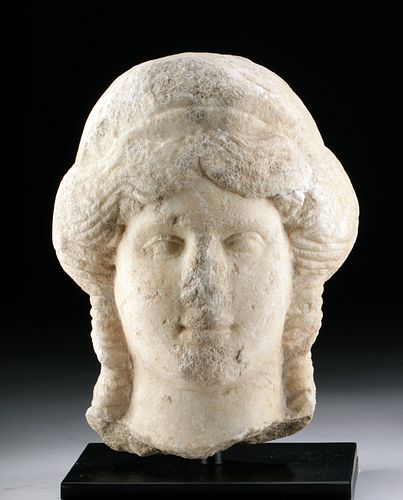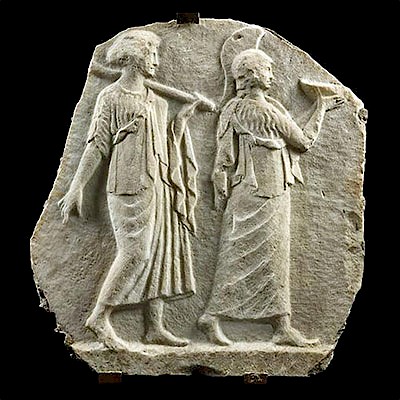Beautiful Roman Marble Janus-Headed Goddess
Lot 48b
About Seller
Artemis Gallery
686 S Taylor Ave, Ste 106
Louisville, CO 80027
United States
Selling antiquities, ancient and ethnographic art online since 1993, Artemis Gallery specializes in Classical Antiquities (Egyptian, Greek, Roman, Near Eastern), Asian, Pre-Columbian, African / Tribal / Oceanographic art. Our extensive inventory includes pottery, stone, metal, wood, glass and textil...Read more
Estimate:
$36,000 - $50,000
Absentee vs Live bid
Two ways to bid:
- Leave a max absentee bid and the platform will bid on your behalf up to your maximum bid during the live auction.
- Bid live during the auction and your bids will be submitted real-time to the auctioneer.
Bid Increments
| Price | Bid Increment |
|---|---|
| $0 | $25 |
| $300 | $50 |
| $1,000 | $100 |
| $2,000 | $250 |
| $5,000 | $500 |
| $10,000 | $1,000 |
| $20,000 | $2,500 |
| $50,000 | $5,000 |
| $100,000 | $10,000 |
| $200,000 | $20,000 |
About Auction
By Artemis Gallery
Feb 13, 2020
Set Reminder
2020-02-13 10:00:00
2020-02-13 10:00:00
America/New_York
Bidsquare
Bidsquare : Exceptional Antiquities, Asian, Ethnographic
https://www.bidsquare.com/auctions/artemis-gallery/exceptional-antiquities-asian-ethnographic-4848
An important one-day auction featuring museum-worthy examples of Egyptian, Greek, Roman, Etruscan, Near Eastern, Far East / Asian, Pre-Columbian, African / Tribal, Oceanic, Native American, Spanish Colonial, Russian, Fossils, Ancient Jewelry, Fine Art, so much more! Artemis Gallery info@artemisgallery.com
An important one-day auction featuring museum-worthy examples of Egyptian, Greek, Roman, Etruscan, Near Eastern, Far East / Asian, Pre-Columbian, African / Tribal, Oceanic, Native American, Spanish Colonial, Russian, Fossils, Ancient Jewelry, Fine Art, so much more! Artemis Gallery info@artemisgallery.com
- Lot Description
Roman, Imperial Period, ca. 1st century CE. Possessing quixotic beauty, a janus-headed female presenting two beautiful visages comprised of almond-shaped eyes with delineated lids, a gently arched browline that meets her aquiline nose above gently smiling lips, softly contoured facial planes, and a slender neck - finely carved from a stone of peachy beige/creamy white hues. Both faces are framed by a wavy coiffure with banana curls falling beside her cheeks and crowned by a diadem; the sides display their wavy locks intertwining in voluminous plaits; above is a drilled hole that perhaps once received a decorative ornament, perhaps a capital if this piece came from a caryatid, or perhaps a third head (if depicting Hecate, see more on this below). Size: 8.375" W x 11.5" H (21.3 cm x 29.2 cm); 17.375" H (44.1 cm) on included custom stand.
Just who may this face have depicted? Janus himself - the god of beginnings, endings, transitions, doorways, time, duality, gates, and passages - was male. Since he was said to look toward both the future and the past, January was named for him and Juno was actually the tutelary goddess of that month, according to the ancient Roman farmer's almanac. So perhaps this piece represents Juno (Greek Hera), queen of the gods and wife of Jupiter Greek Zeus). It is also possible that she represents two of the three faces of Hekate/Hecate, the goddess of the moon with three forms: Selene the Moon in heaven, Artemis the Huntress on earth, and Persephone the Destroyer in the underworld - who reigned over three kingdoms (earth, sea, and sky) and possessed the power to both create and prevent storms, a trait that led to her patronage by shepherds. Beyond this, Hecate in her triplicate manifestation, is also associated with crossroads, entryways, magic, witchcraft, knowledge of herbs and poisonous plants, and sorcery. Her identity withstanding, it is easy to admire this stunning sculptural work for its presentation of a young and classically beautiful face with a serene expression - clearly intended to be admired on all sides.
Provenance: ex-William Froelich collection, New York, USA, acquired in the 1970s
All items legal to buy/sell under U.S. Statute covering cultural patrimony Code 2600, CHAPTER 14, and are guaranteed to be as described or your money back.
A Certificate of Authenticity will accompany all winning bids.
We ship worldwide and handle all shipping in-house for your convenience.
#149875A section from a larger sculpture. Drilled hole atop for former attachment, perhaps an ornament or capital. Expected surface wear/weathering and abrasions/losses to noses and other high pointed areas. Nevertheless, this piece is still captivating with skillfully executed modeling and radiant details.Condition
- Shipping Info
-
All shipping is handled in-house for your convenience. Your invoice from Artemis Gallery will include shipping calculation instructions. If in doubt, please inquire BEFORE bidding for estimated shipping costs for individual items.
-
- Buyer's Premium



 EUR
EUR CAD
CAD AUD
AUD GBP
GBP MXN
MXN HKD
HKD CNY
CNY MYR
MYR SEK
SEK SGD
SGD CHF
CHF THB
THB


















